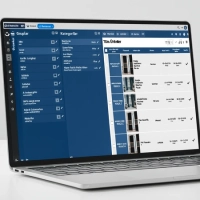
E-commerce, which emerged in 1995 with the rise of the internet, is the term used to describe the entire process of platforms that allow for the effortless buying and selling of products and services online. Accelerating with technological advancements, e-commerce has completely transformed shopping habits in our country and around the world. While products used to be sold in stores, markets, and marketplaces, the concept of e-commerce has made it possible to purchase products from the comfort of our own home, using our computers or mobile phones.
E-commerce is a structure that encompasses many processes. Sellers store their products and share important information with buyers, such as technical specifications, pricing, and shipping, through their website. Once a buyer completes a purchase, the seller prepares the product and ships it to the requested address.
In recent years, e-commerce has become a key sales and marketing channel for countries and companies. TÜSİAD, which publishes an annual report on this topic in Turkey, revealed that 1.36 billion products were purchased through e-commerce channels in 2019, with an average purchase price of 99.5 lira. E-commerce, which achieves steady growth every year, has led to the development of diverse concepts and strategies by experts in the field.
Sellers seeking to market their products and services through e-commerce are turning to professional solutions to manage the process effectively. Sellers, who must manage a vast array of tasks, including product management, tax regulations, payment and shipping integration, customer relations, logistics, and personnel, are finding it easier to manage their businesses with automation software developed by experts.
Features of Comwize E-commerce Software
E-Commerce Management
An e-commerce platform requires modules that serve general functionality, such as product management, category management, payment system integrations, shipment tracking integrations, and marketplace integrations. Comwize allows you to manage the system effortlessly with modules specifically designed to handle all of these tasks.
E-Export Management
Do you want to sell internationally? With Comwize, you can organize your entire system by country, set product prices by country, and have a shipping and payment system for each country.
Customer Relationship Management
Comwize records data on your behalf that will be useful for you in the future, such as the offers you make to your customers, call and communication records, visit and other notes, both during and after the sale. It allows you to view all records for a specific customer whenever you need them in a few simple steps. It also helps you save time by allowing you to reuse the offer draft you save in the system over and over again.
Financial Instruments
E-commerce platforms are legally no different from any other store. Just as a store handles current accounts, cash transactions, bank transactions, invoices/e-invoices, and e-collections, e-commerce platforms must manage the same processes. Comwize's integrated structure handles these processes on your behalf, giving you added freedom.
Production Management Tools
The production module in Comwize allows you to easily record or perform tasks such as order-based production planning, creating and managing production units, creating and tracking production requests, inventory management, warehouse management and production recipes.
Purchasing and Shipping
With Comwize, you'll find simple and accessible menus for topics like inventory control, warehouse management, cargo tracking integration, and supplier management. Integrating the module of your partner cargo company into the system is a matter of just a few clicks and confirmations.
Personnel Affairs
Although e-commerce takes place in a virtual environment, the processes that need to be executed behind the scenes require human resources. Therefore, Comwize e-commerce software includes all the modules you need. Comwize e-commerce software effortlessly manages your responsibilities, including employee personnel files, leave and health report statements, advance and salary payments, and tracking insurance and similar legal procedures.

























